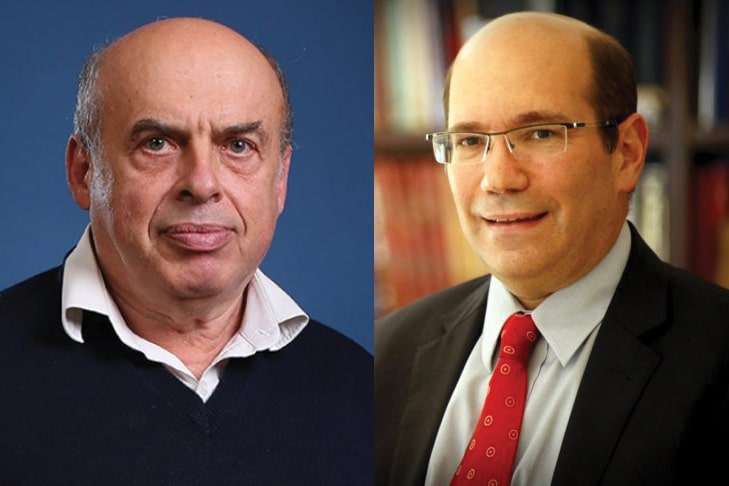 Natan Sharansky, left and Gil Troy
Natan Sharansky, left and Gil Troy Natan Sharansky and Gil Troy, co-authors of “Never Alone,” spoke with Jewish Journal book editor Jonathan Kirsch via Zoom from Jerusalem.
Jewish Journal: You point out in “Never Alone” that a million Jews have made aliyah from the former Soviet Union. How did Israel change as a result of their arrival?
Natan Sharansky: The Jews who came from Russia were people who, for at least two generations, suffered from anti-Semitism but were disconnected from everything Jewish. We were taught by our parents that the secret of survival in the Soviet Union was to make efforts to be professionally the best — that was the expression of our Jewishness. So, the Soviet Jews brought a lot of ambition and competition to Israel, and they contributed to Israel’s achievements as the “startup nation.”
JJ: Gil, how did you come to collaborate with Natan on “Never Alone”?
Gil Troy: When I finished my last book, “The Zionist Ideas,” I wanted Natan to write a foreword. After all, who else is the best symbol of modern Zionism? I received a call from his secretary inviting me to a meeting at the Jewish Agency. I’m there thinking we’re going to talk about the foreword to my book (which he had already decided to do), and Natan is talking about writing a book of his own. He asked me to collaborate with him. If the KGB couldn’t say no to him, I certainly couldn’t say no to him. It was really one of the great privileges of my life and a great adventure.
NS: When the KGB asked me questions, I’d say, “No, no, no.” With Gil, it was different. When he had an idea, I’d say, “No, no, no,” but after the third time, I’d say yes.
JJ: Natan, you played a historic role in challenging the Soviet Union. Now that the Soviet Union is gone, do you still regard Russia as a threat to the world?
NS: Russia is not the kind of dictatorship that it was. Even if there has been some retreat from democracy, Russia does not have and cannot have a gulag and a KGB with millions of informers. Even if they want to control the brains of their people, they can’t. And economically, except for nuclear weapons, Russia is a Third World country. Russia will not be a threat to the West if the West does not go back to the fears and the illusions that it once had about the Soviet Union.
“If there is one thing that makes me concerned today, it’s not what is happening in Russia and it’s not what is happening in Israel. What worries me is the cancel culture that makes some Americans think twice before expressing themselves.”
— Natan Sharansky
JJ: You have been a leader in the fight against anti-Semitism around the world. Here in the United States, for the first time in recent memory, we have seen demonstrators in the streets who chant, “The Jews will not replace us.” Are you concerned that anti-Semitism in America has moved from the lunatic fringe to the public square?
NS: I am concerned about the rise of both left-wing and right-wing anti-Semitism. Left-wing anti-Semitism, which is mainly expressed as anti-Zionism, grows out of the modernist desire to see the world without nations and without religions, like the famous [John Lennon] song “Imagine.” Sooner or later, there had to be counterattacks from those on the right who want to restore national pride. That’s why you see posters of George Soros in Hungary that blame him for Muslim refugees. It is very symmetrical, and my concern is that people refuse to see anti-Semitism when it happens in their own camp.
GT: One of the themes of our book — and one of themes of Natan’s life — is that you have to take personal responsibility for what you believe. Anti-Semitism is anti-Semitism, and it must be regarded as a red line. People on the left must fight anti-Semitism on the left and people on the right must fight anti-Semitism on the right.
JJ: Natan, you famously proposed the “town square test,” which asks whether people feel free or fearful when it comes to expressing their opinions in public. If you apply the test to Russia, Israel and America, how do these countries measure up?
NS: If there is one thing that makes me concerned today, it’s not what is happening in Russia and it’s not what is happening in Israel. What worries me is the cancel culture that makes some Americans think twice before expressing themselves. On a book tour, I met a woman who was a student at Harvard who told me she wanted to sign an anti-BDS (boycott, divestment and sanctions) letter, but she was worried that three of her professors wouldn’t like it. That’s something alarming. And I was shocked that it was happening not in Moscow but at Harvard.






















 More news and opinions than at a Shabbat dinner, right in your inbox.
More news and opinions than at a Shabbat dinner, right in your inbox.